PSYC1000 Assignment: Analyzing Bandura's Social Cognitive Theory
VerifiedAdded on 2023/01/11
|7
|1846
|22
Homework Assignment
AI Summary
This assignment delves into the application of Bandura's Social Cognitive Theory to understand the impact of video games on behavior, specifically examining the relationship between prosocial and antisocial video games and their effects. It analyzes the Greitemeyer and Osswald (2011) study, exploring how the stages of attention, retention, reproduction, and motivation, as described by Bandura, explain observed behaviors. The assignment also explores how similarity in video game characters influences aggression, the causal link between violent video games and real-life aggression, and how the findings relate to health behavior programs. The work considers the influence of violent and prosocial video games on the development of behaviors and the implications of these findings for real-world applications. It references several sources to support the arguments and findings.
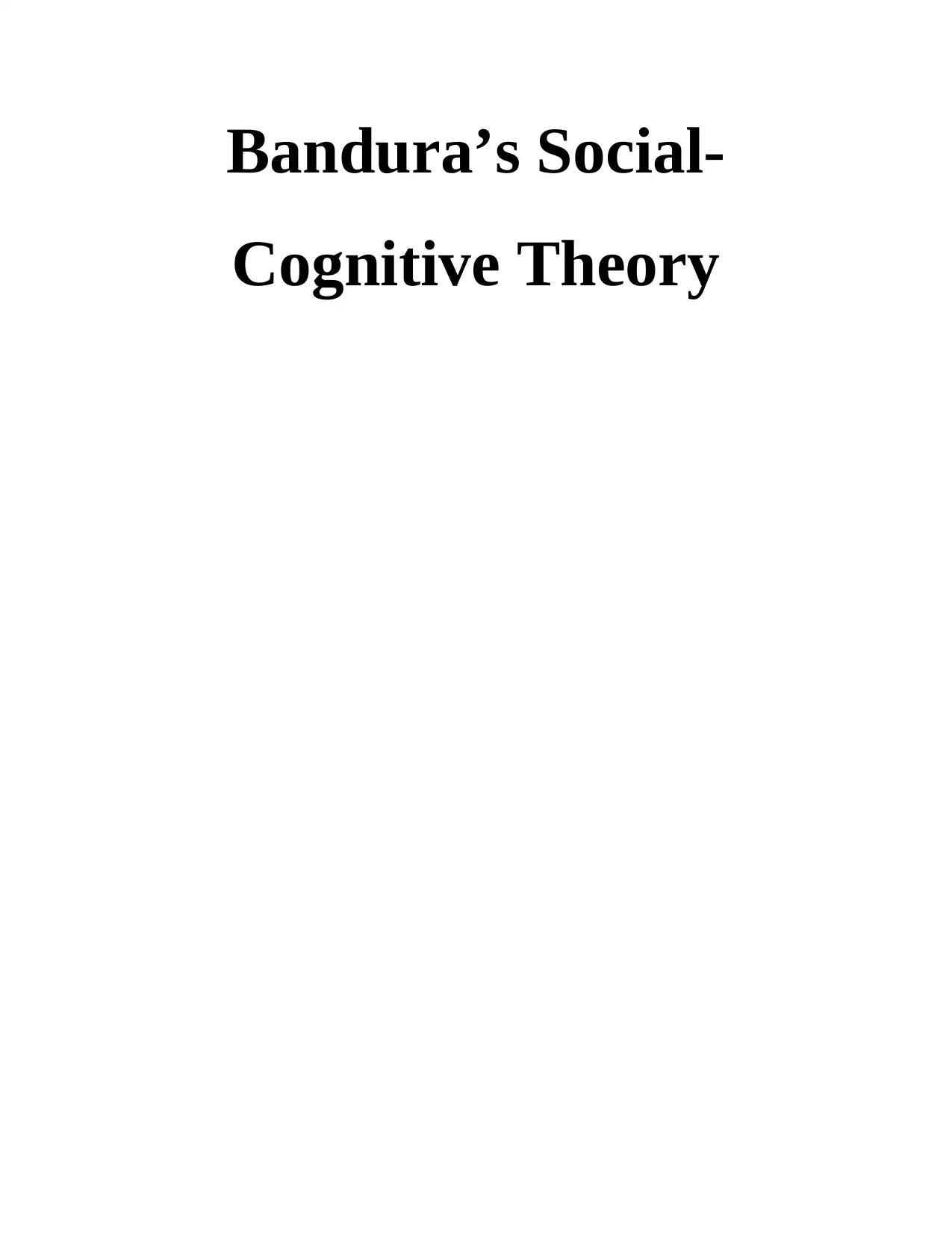
Bandura’s Social-
Cognitive Theory
Cognitive Theory
Paraphrase This Document
Need a fresh take? Get an instant paraphrase of this document with our AI Paraphraser
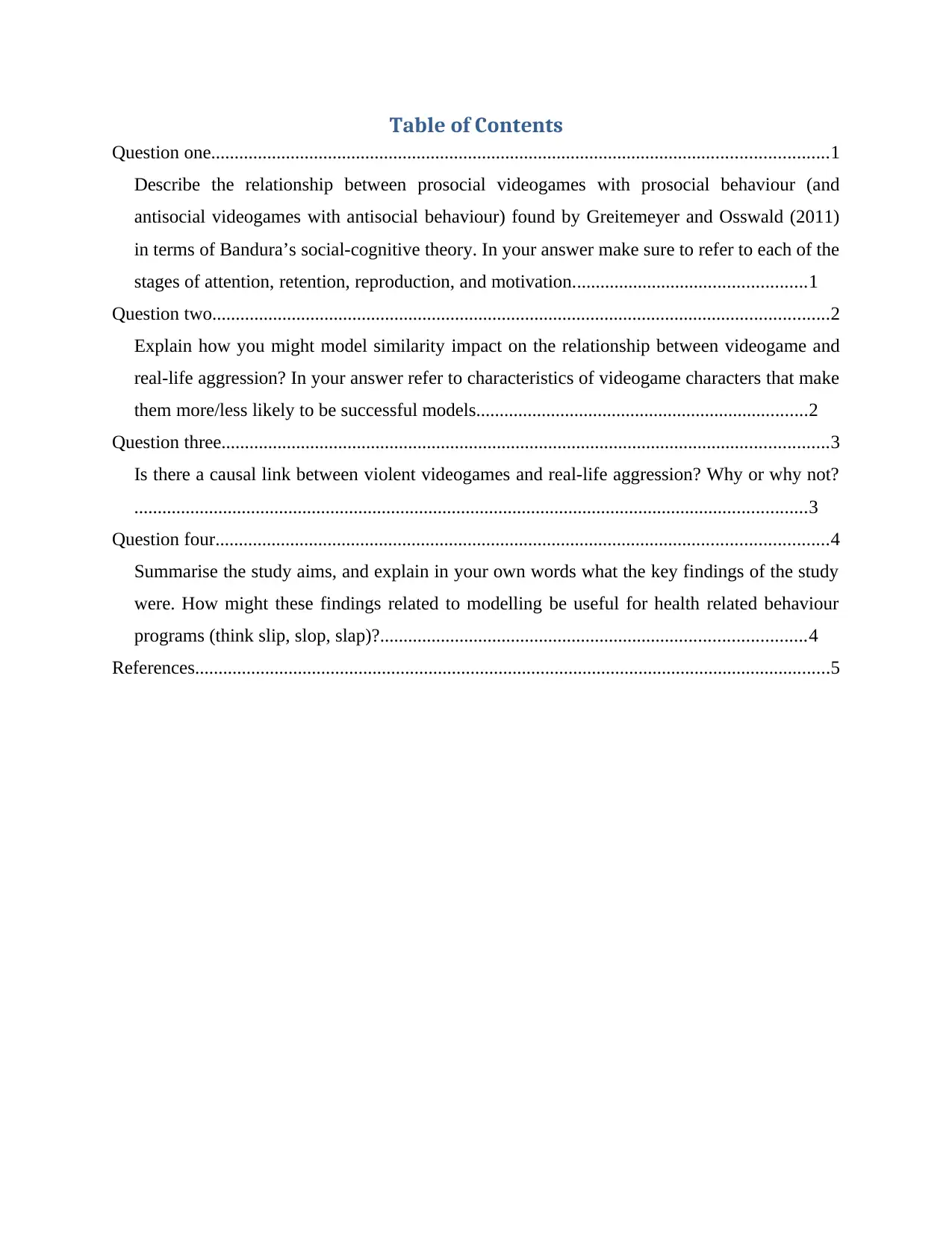
Table of Contents
Question one....................................................................................................................................1
Describe the relationship between prosocial videogames with prosocial behaviour (and
antisocial videogames with antisocial behaviour) found by Greitemeyer and Osswald (2011)
in terms of Bandura’s social-cognitive theory. In your answer make sure to refer to each of the
stages of attention, retention, reproduction, and motivation..................................................1
Question two....................................................................................................................................2
Explain how you might model similarity impact on the relationship between videogame and
real-life aggression? In your answer refer to characteristics of videogame characters that make
them more/less likely to be successful models.......................................................................2
Question three..................................................................................................................................3
Is there a causal link between violent videogames and real-life aggression? Why or why not?
................................................................................................................................................3
Question four...................................................................................................................................4
Summarise the study aims, and explain in your own words what the key findings of the study
were. How might these findings related to modelling be useful for health related behaviour
programs (think slip, slop, slap)?...........................................................................................4
References........................................................................................................................................5
Question one....................................................................................................................................1
Describe the relationship between prosocial videogames with prosocial behaviour (and
antisocial videogames with antisocial behaviour) found by Greitemeyer and Osswald (2011)
in terms of Bandura’s social-cognitive theory. In your answer make sure to refer to each of the
stages of attention, retention, reproduction, and motivation..................................................1
Question two....................................................................................................................................2
Explain how you might model similarity impact on the relationship between videogame and
real-life aggression? In your answer refer to characteristics of videogame characters that make
them more/less likely to be successful models.......................................................................2
Question three..................................................................................................................................3
Is there a causal link between violent videogames and real-life aggression? Why or why not?
................................................................................................................................................3
Question four...................................................................................................................................4
Summarise the study aims, and explain in your own words what the key findings of the study
were. How might these findings related to modelling be useful for health related behaviour
programs (think slip, slop, slap)?...........................................................................................4
References........................................................................................................................................5
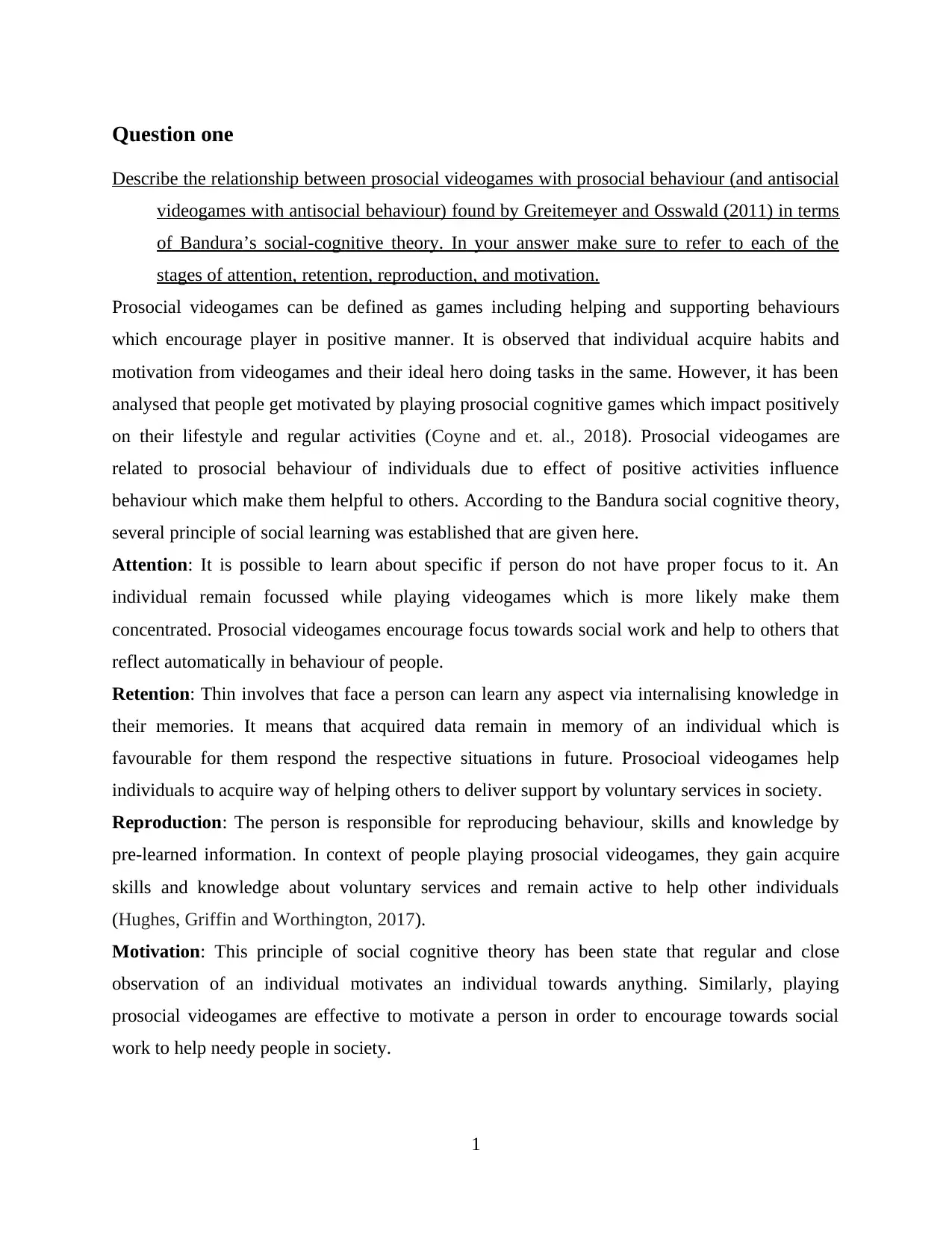
Question one
Describe the relationship between prosocial videogames with prosocial behaviour (and antisocial
videogames with antisocial behaviour) found by Greitemeyer and Osswald (2011) in terms
of Bandura’s social-cognitive theory. In your answer make sure to refer to each of the
stages of attention, retention, reproduction, and motivation.
Prosocial videogames can be defined as games including helping and supporting behaviours
which encourage player in positive manner. It is observed that individual acquire habits and
motivation from videogames and their ideal hero doing tasks in the same. However, it has been
analysed that people get motivated by playing prosocial cognitive games which impact positively
on their lifestyle and regular activities (Coyne and et. al., 2018). Prosocial videogames are
related to prosocial behaviour of individuals due to effect of positive activities influence
behaviour which make them helpful to others. According to the Bandura social cognitive theory,
several principle of social learning was established that are given here.
Attention: It is possible to learn about specific if person do not have proper focus to it. An
individual remain focussed while playing videogames which is more likely make them
concentrated. Prosocial videogames encourage focus towards social work and help to others that
reflect automatically in behaviour of people.
Retention: Thin involves that face a person can learn any aspect via internalising knowledge in
their memories. It means that acquired data remain in memory of an individual which is
favourable for them respond the respective situations in future. Prosocioal videogames help
individuals to acquire way of helping others to deliver support by voluntary services in society.
Reproduction: The person is responsible for reproducing behaviour, skills and knowledge by
pre-learned information. In context of people playing prosocial videogames, they gain acquire
skills and knowledge about voluntary services and remain active to help other individuals
(Hughes, Griffin and Worthington, 2017).
Motivation: This principle of social cognitive theory has been state that regular and close
observation of an individual motivates an individual towards anything. Similarly, playing
prosocial videogames are effective to motivate a person in order to encourage towards social
work to help needy people in society.
1
Describe the relationship between prosocial videogames with prosocial behaviour (and antisocial
videogames with antisocial behaviour) found by Greitemeyer and Osswald (2011) in terms
of Bandura’s social-cognitive theory. In your answer make sure to refer to each of the
stages of attention, retention, reproduction, and motivation.
Prosocial videogames can be defined as games including helping and supporting behaviours
which encourage player in positive manner. It is observed that individual acquire habits and
motivation from videogames and their ideal hero doing tasks in the same. However, it has been
analysed that people get motivated by playing prosocial cognitive games which impact positively
on their lifestyle and regular activities (Coyne and et. al., 2018). Prosocial videogames are
related to prosocial behaviour of individuals due to effect of positive activities influence
behaviour which make them helpful to others. According to the Bandura social cognitive theory,
several principle of social learning was established that are given here.
Attention: It is possible to learn about specific if person do not have proper focus to it. An
individual remain focussed while playing videogames which is more likely make them
concentrated. Prosocial videogames encourage focus towards social work and help to others that
reflect automatically in behaviour of people.
Retention: Thin involves that face a person can learn any aspect via internalising knowledge in
their memories. It means that acquired data remain in memory of an individual which is
favourable for them respond the respective situations in future. Prosocioal videogames help
individuals to acquire way of helping others to deliver support by voluntary services in society.
Reproduction: The person is responsible for reproducing behaviour, skills and knowledge by
pre-learned information. In context of people playing prosocial videogames, they gain acquire
skills and knowledge about voluntary services and remain active to help other individuals
(Hughes, Griffin and Worthington, 2017).
Motivation: This principle of social cognitive theory has been state that regular and close
observation of an individual motivates an individual towards anything. Similarly, playing
prosocial videogames are effective to motivate a person in order to encourage towards social
work to help needy people in society.
1
⊘ This is a preview!⊘
Do you want full access?
Subscribe today to unlock all pages.

Trusted by 1+ million students worldwide
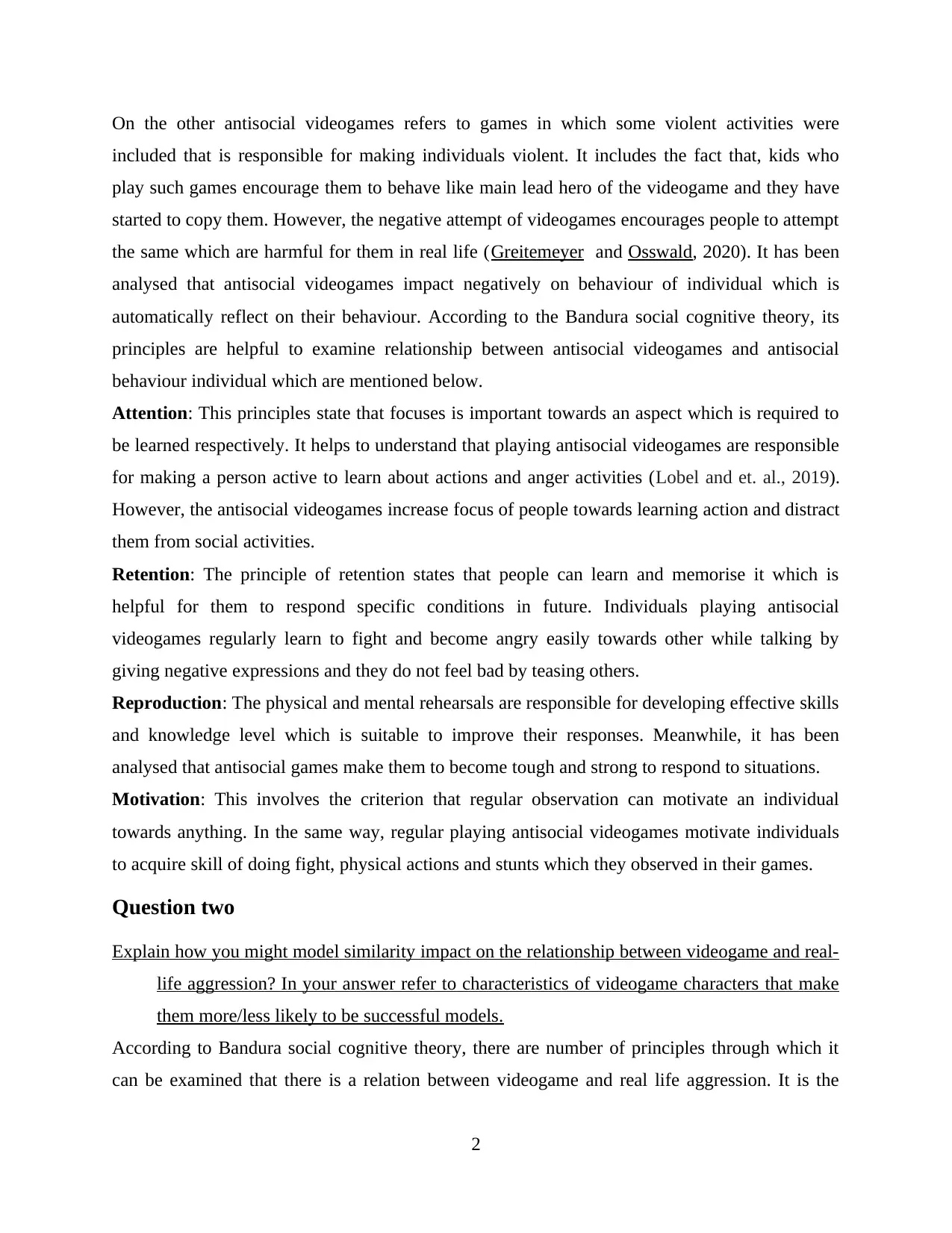
On the other antisocial videogames refers to games in which some violent activities were
included that is responsible for making individuals violent. It includes the fact that, kids who
play such games encourage them to behave like main lead hero of the videogame and they have
started to copy them. However, the negative attempt of videogames encourages people to attempt
the same which are harmful for them in real life (Greitemeyer and Osswald, 2020). It has been
analysed that antisocial videogames impact negatively on behaviour of individual which is
automatically reflect on their behaviour. According to the Bandura social cognitive theory, its
principles are helpful to examine relationship between antisocial videogames and antisocial
behaviour individual which are mentioned below.
Attention: This principles state that focuses is important towards an aspect which is required to
be learned respectively. It helps to understand that playing antisocial videogames are responsible
for making a person active to learn about actions and anger activities (Lobel and et. al., 2019).
However, the antisocial videogames increase focus of people towards learning action and distract
them from social activities.
Retention: The principle of retention states that people can learn and memorise it which is
helpful for them to respond specific conditions in future. Individuals playing antisocial
videogames regularly learn to fight and become angry easily towards other while talking by
giving negative expressions and they do not feel bad by teasing others.
Reproduction: The physical and mental rehearsals are responsible for developing effective skills
and knowledge level which is suitable to improve their responses. Meanwhile, it has been
analysed that antisocial games make them to become tough and strong to respond to situations.
Motivation: This involves the criterion that regular observation can motivate an individual
towards anything. In the same way, regular playing antisocial videogames motivate individuals
to acquire skill of doing fight, physical actions and stunts which they observed in their games.
Question two
Explain how you might model similarity impact on the relationship between videogame and real-
life aggression? In your answer refer to characteristics of videogame characters that make
them more/less likely to be successful models.
According to Bandura social cognitive theory, there are number of principles through which it
can be examined that there is a relation between videogame and real life aggression. It is the
2
included that is responsible for making individuals violent. It includes the fact that, kids who
play such games encourage them to behave like main lead hero of the videogame and they have
started to copy them. However, the negative attempt of videogames encourages people to attempt
the same which are harmful for them in real life (Greitemeyer and Osswald, 2020). It has been
analysed that antisocial videogames impact negatively on behaviour of individual which is
automatically reflect on their behaviour. According to the Bandura social cognitive theory, its
principles are helpful to examine relationship between antisocial videogames and antisocial
behaviour individual which are mentioned below.
Attention: This principles state that focuses is important towards an aspect which is required to
be learned respectively. It helps to understand that playing antisocial videogames are responsible
for making a person active to learn about actions and anger activities (Lobel and et. al., 2019).
However, the antisocial videogames increase focus of people towards learning action and distract
them from social activities.
Retention: The principle of retention states that people can learn and memorise it which is
helpful for them to respond specific conditions in future. Individuals playing antisocial
videogames regularly learn to fight and become angry easily towards other while talking by
giving negative expressions and they do not feel bad by teasing others.
Reproduction: The physical and mental rehearsals are responsible for developing effective skills
and knowledge level which is suitable to improve their responses. Meanwhile, it has been
analysed that antisocial games make them to become tough and strong to respond to situations.
Motivation: This involves the criterion that regular observation can motivate an individual
towards anything. In the same way, regular playing antisocial videogames motivate individuals
to acquire skill of doing fight, physical actions and stunts which they observed in their games.
Question two
Explain how you might model similarity impact on the relationship between videogame and real-
life aggression? In your answer refer to characteristics of videogame characters that make
them more/less likely to be successful models.
According to Bandura social cognitive theory, there are number of principles through which it
can be examined that there is a relation between videogame and real life aggression. It is the
2
Paraphrase This Document
Need a fresh take? Get an instant paraphrase of this document with our AI Paraphraser
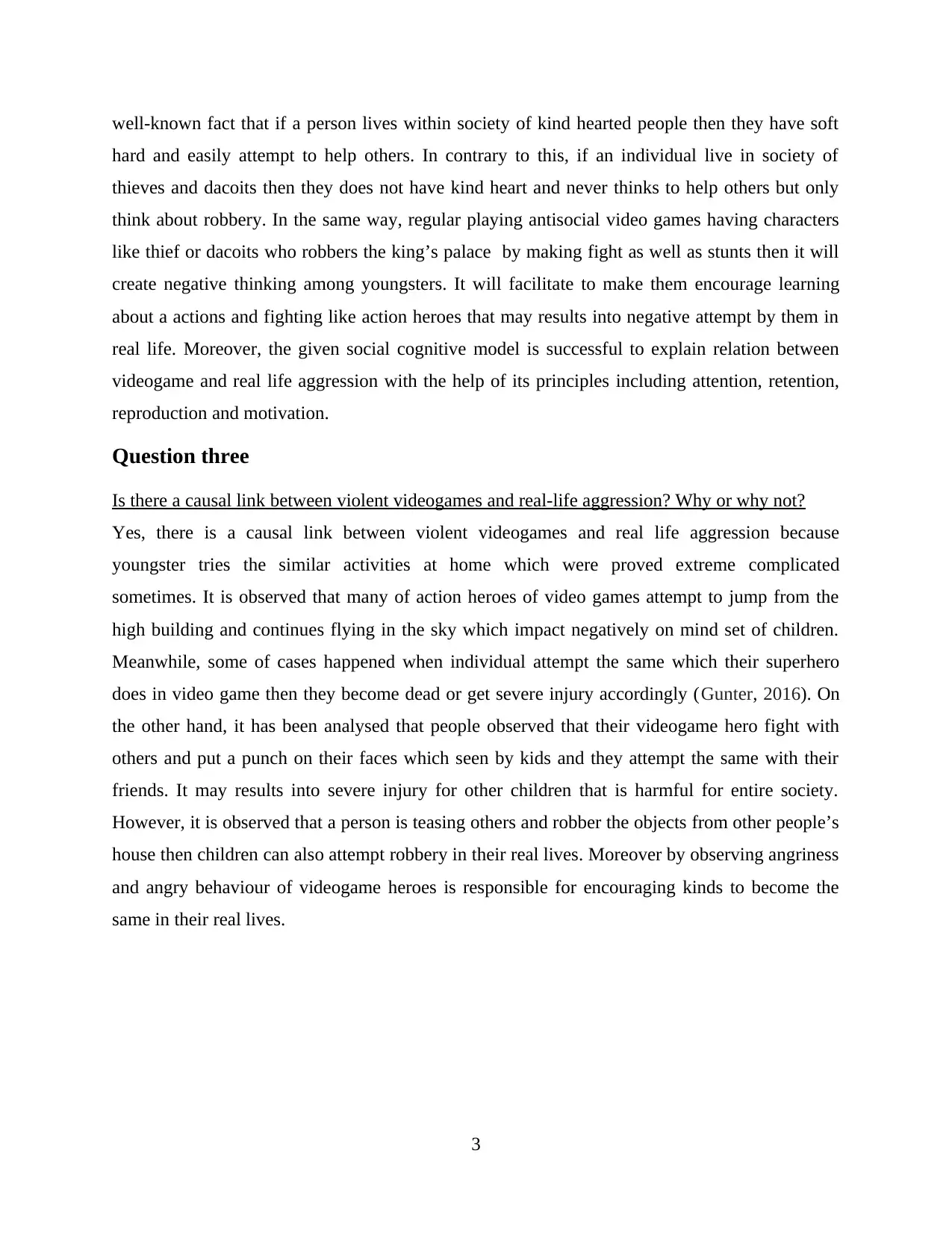
well-known fact that if a person lives within society of kind hearted people then they have soft
hard and easily attempt to help others. In contrary to this, if an individual live in society of
thieves and dacoits then they does not have kind heart and never thinks to help others but only
think about robbery. In the same way, regular playing antisocial video games having characters
like thief or dacoits who robbers the king’s palace by making fight as well as stunts then it will
create negative thinking among youngsters. It will facilitate to make them encourage learning
about a actions and fighting like action heroes that may results into negative attempt by them in
real life. Moreover, the given social cognitive model is successful to explain relation between
videogame and real life aggression with the help of its principles including attention, retention,
reproduction and motivation.
Question three
Is there a causal link between violent videogames and real-life aggression? Why or why not?
Yes, there is a causal link between violent videogames and real life aggression because
youngster tries the similar activities at home which were proved extreme complicated
sometimes. It is observed that many of action heroes of video games attempt to jump from the
high building and continues flying in the sky which impact negatively on mind set of children.
Meanwhile, some of cases happened when individual attempt the same which their superhero
does in video game then they become dead or get severe injury accordingly (Gunter, 2016). On
the other hand, it has been analysed that people observed that their videogame hero fight with
others and put a punch on their faces which seen by kids and they attempt the same with their
friends. It may results into severe injury for other children that is harmful for entire society.
However, it is observed that a person is teasing others and robber the objects from other people’s
house then children can also attempt robbery in their real lives. Moreover by observing angriness
and angry behaviour of videogame heroes is responsible for encouraging kinds to become the
same in their real lives.
3
hard and easily attempt to help others. In contrary to this, if an individual live in society of
thieves and dacoits then they does not have kind heart and never thinks to help others but only
think about robbery. In the same way, regular playing antisocial video games having characters
like thief or dacoits who robbers the king’s palace by making fight as well as stunts then it will
create negative thinking among youngsters. It will facilitate to make them encourage learning
about a actions and fighting like action heroes that may results into negative attempt by them in
real life. Moreover, the given social cognitive model is successful to explain relation between
videogame and real life aggression with the help of its principles including attention, retention,
reproduction and motivation.
Question three
Is there a causal link between violent videogames and real-life aggression? Why or why not?
Yes, there is a causal link between violent videogames and real life aggression because
youngster tries the similar activities at home which were proved extreme complicated
sometimes. It is observed that many of action heroes of video games attempt to jump from the
high building and continues flying in the sky which impact negatively on mind set of children.
Meanwhile, some of cases happened when individual attempt the same which their superhero
does in video game then they become dead or get severe injury accordingly (Gunter, 2016). On
the other hand, it has been analysed that people observed that their videogame hero fight with
others and put a punch on their faces which seen by kids and they attempt the same with their
friends. It may results into severe injury for other children that is harmful for entire society.
However, it is observed that a person is teasing others and robber the objects from other people’s
house then children can also attempt robbery in their real lives. Moreover by observing angriness
and angry behaviour of videogame heroes is responsible for encouraging kinds to become the
same in their real lives.
3
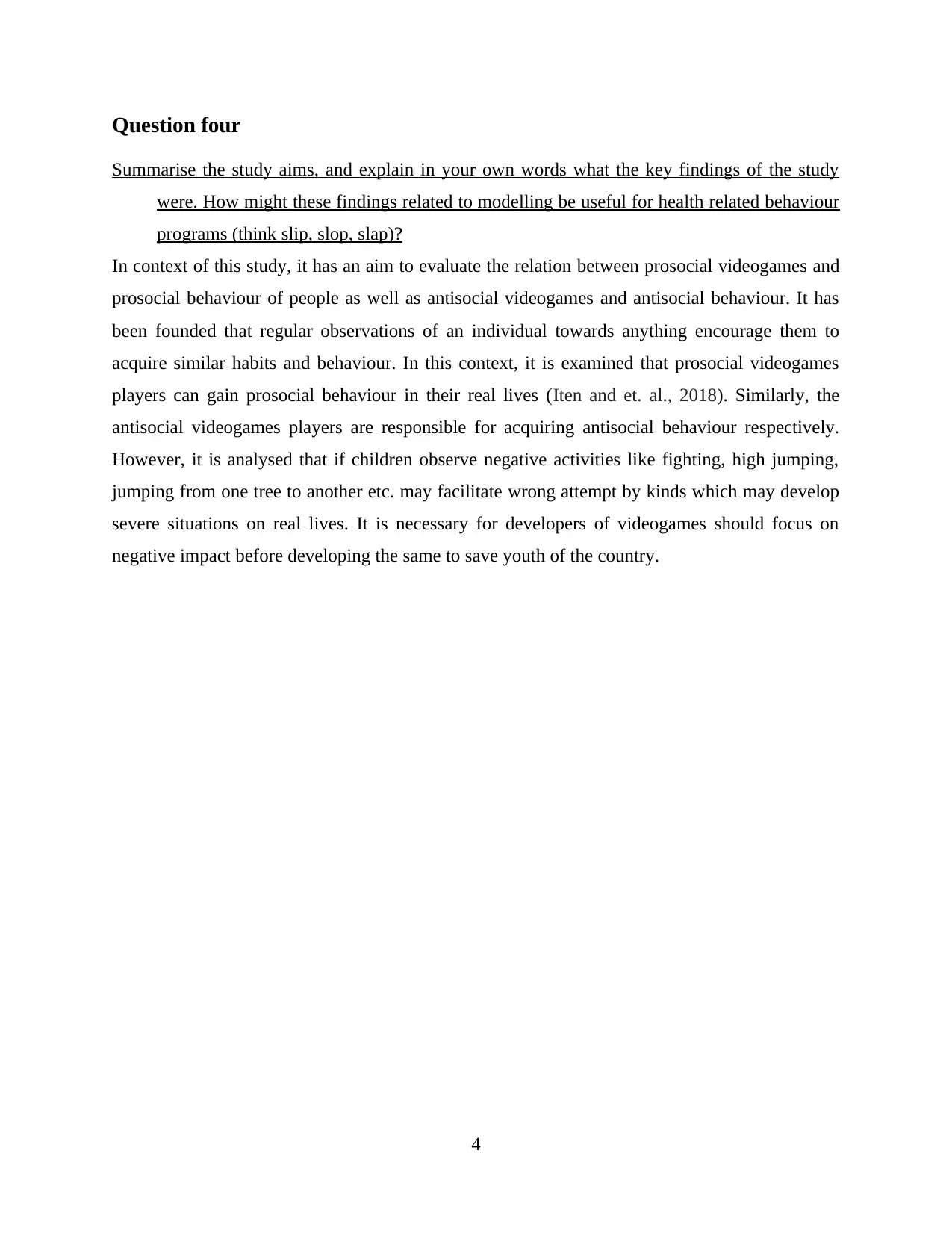
Question four
Summarise the study aims, and explain in your own words what the key findings of the study
were. How might these findings related to modelling be useful for health related behaviour
programs (think slip, slop, slap)?
In context of this study, it has an aim to evaluate the relation between prosocial videogames and
prosocial behaviour of people as well as antisocial videogames and antisocial behaviour. It has
been founded that regular observations of an individual towards anything encourage them to
acquire similar habits and behaviour. In this context, it is examined that prosocial videogames
players can gain prosocial behaviour in their real lives (Iten and et. al., 2018). Similarly, the
antisocial videogames players are responsible for acquiring antisocial behaviour respectively.
However, it is analysed that if children observe negative activities like fighting, high jumping,
jumping from one tree to another etc. may facilitate wrong attempt by kinds which may develop
severe situations on real lives. It is necessary for developers of videogames should focus on
negative impact before developing the same to save youth of the country.
4
Summarise the study aims, and explain in your own words what the key findings of the study
were. How might these findings related to modelling be useful for health related behaviour
programs (think slip, slop, slap)?
In context of this study, it has an aim to evaluate the relation between prosocial videogames and
prosocial behaviour of people as well as antisocial videogames and antisocial behaviour. It has
been founded that regular observations of an individual towards anything encourage them to
acquire similar habits and behaviour. In this context, it is examined that prosocial videogames
players can gain prosocial behaviour in their real lives (Iten and et. al., 2018). Similarly, the
antisocial videogames players are responsible for acquiring antisocial behaviour respectively.
However, it is analysed that if children observe negative activities like fighting, high jumping,
jumping from one tree to another etc. may facilitate wrong attempt by kinds which may develop
severe situations on real lives. It is necessary for developers of videogames should focus on
negative impact before developing the same to save youth of the country.
4
⊘ This is a preview!⊘
Do you want full access?
Subscribe today to unlock all pages.

Trusted by 1+ million students worldwide
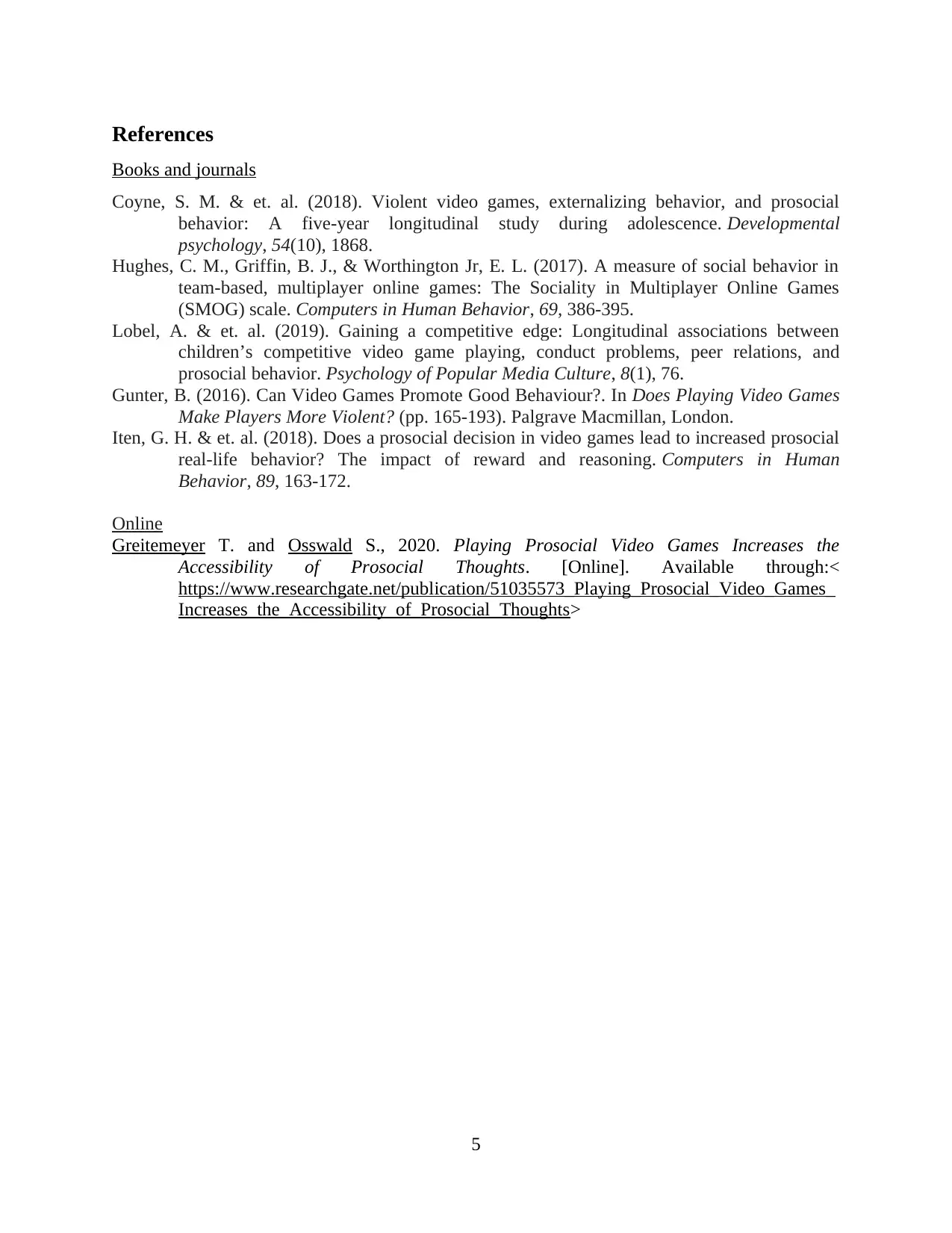
References
Books and journals
Coyne, S. M. & et. al. (2018). Violent video games, externalizing behavior, and prosocial
behavior: A five-year longitudinal study during adolescence. Developmental
psychology, 54(10), 1868.
Hughes, C. M., Griffin, B. J., & Worthington Jr, E. L. (2017). A measure of social behavior in
team-based, multiplayer online games: The Sociality in Multiplayer Online Games
(SMOG) scale. Computers in Human Behavior, 69, 386-395.
Lobel, A. & et. al. (2019). Gaining a competitive edge: Longitudinal associations between
children’s competitive video game playing, conduct problems, peer relations, and
prosocial behavior. Psychology of Popular Media Culture, 8(1), 76.
Gunter, B. (2016). Can Video Games Promote Good Behaviour?. In Does Playing Video Games
Make Players More Violent? (pp. 165-193). Palgrave Macmillan, London.
Iten, G. H. & et. al. (2018). Does a prosocial decision in video games lead to increased prosocial
real-life behavior? The impact of reward and reasoning. Computers in Human
Behavior, 89, 163-172.
Online
Greitemeyer T. and Osswald S., 2020. Playing Prosocial Video Games Increases the
Accessibility of Prosocial Thoughts. [Online]. Available through:<
https://www.researchgate.net/publication/51035573_Playing_Prosocial_Video_Games_
Increases_the_Accessibility_of_Prosocial_Thoughts>
5
Books and journals
Coyne, S. M. & et. al. (2018). Violent video games, externalizing behavior, and prosocial
behavior: A five-year longitudinal study during adolescence. Developmental
psychology, 54(10), 1868.
Hughes, C. M., Griffin, B. J., & Worthington Jr, E. L. (2017). A measure of social behavior in
team-based, multiplayer online games: The Sociality in Multiplayer Online Games
(SMOG) scale. Computers in Human Behavior, 69, 386-395.
Lobel, A. & et. al. (2019). Gaining a competitive edge: Longitudinal associations between
children’s competitive video game playing, conduct problems, peer relations, and
prosocial behavior. Psychology of Popular Media Culture, 8(1), 76.
Gunter, B. (2016). Can Video Games Promote Good Behaviour?. In Does Playing Video Games
Make Players More Violent? (pp. 165-193). Palgrave Macmillan, London.
Iten, G. H. & et. al. (2018). Does a prosocial decision in video games lead to increased prosocial
real-life behavior? The impact of reward and reasoning. Computers in Human
Behavior, 89, 163-172.
Online
Greitemeyer T. and Osswald S., 2020. Playing Prosocial Video Games Increases the
Accessibility of Prosocial Thoughts. [Online]. Available through:<
https://www.researchgate.net/publication/51035573_Playing_Prosocial_Video_Games_
Increases_the_Accessibility_of_Prosocial_Thoughts>
5
1 out of 7
Related Documents
Your All-in-One AI-Powered Toolkit for Academic Success.
+13062052269
info@desklib.com
Available 24*7 on WhatsApp / Email
![[object Object]](/_next/static/media/star-bottom.7253800d.svg)
Unlock your academic potential
Copyright © 2020–2026 A2Z Services. All Rights Reserved. Developed and managed by ZUCOL.





